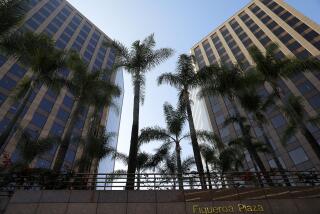Court Told Bills Often Faked
- Share via
The man who first confronted public relations giant Fleishman-Hillard Inc. about allegedly bilking clients testified that he falsified billings at the direction of superiors who are now on trial for criminal conspiracy and fraud.
Fred Muir, a former Times reporter and editor, testified that he quit his job at the corporation’s Los Angeles office in protest over the alleged fraud, for which the company has refunded the city of Los Angeles more than $6 million. He said he was directed to file false documents by his boss, John Stodder Jr.
“At the direction of John Stodder, there were occasions when I believe I may have written up some of those bills. It was largely in ignorance of what I was doing,” Muir testified in federal court Wednesday.
Stodder and Douglas Dowie, a political power broker and former head of Fleishman-Hillard’s Los Angeles office, are on trial for the alleged scheme to overbill the Los Angeles Department of Water and Power, the Port of Los Angeles, the city’s airport agency and several private businesses.
The scandal was at the heart of allegations of influence-peddling at City Hall, which played a central role in the defeat of former mayor and Dowie confidant James K. Hahn by Mayor Antonio Villaraigosa.
Unlike other prosecution witnesses, Muir testified without having been granted immunity from prosecution. And unlike others, he said he quit in protest over what he called improper billing.
“I came to my own determination that it was fraudulent, and that it was wrong, and that I didn’t want to be a part of it,” Muir said.
Under cross-examination, Muir testified that he wanted more than the $170,000 a year he received at his hiring, that he felt he had lost a bonus because of an unfair performance review by Stodder, and that he had developed a strong distaste for Dowie.
Muir also conceded that he did not initially report the wrongdoing to either Fleishman-Hillard headquarters in St. Louis or prosecutors in Los Angeles.
But during 7 1/2 straight hours on the witness stand with three 15-minute breaks, Muir did not waver from allegations that his superiors billed fraudulently. He found many different ways to say that individual bills for his time were false: “I did not work that time,” “No I did not -- I did not work that additional time,” and “I did not work those additional hours.”
Prosecutors in the courtroom of U.S. District Judge Gary A. Feess questioned Muir about an e-mail from Stodder on Sept. 9, 2003, in which he urged his staff to bill more hours.
“By hook or by crook, we have to do it,” according to a portion of the communication. Stodder asked for a report on “what your next steps will be to gin up this part of the DWP account.”
Stodder has denied knowledge of any false billings; Dowie said the scheme was run by two subordinates, and his lawyers told jurors he had no knowledge of it.
In a separate lawsuit against his former employer, Dowie alleged that he was fired to cover an illegal scheme to reimburse Los Angeles workers who made campaign contributions to favored politicians, allegations Fleishman-Hillard has flatly denied.
At midmorning Thursday, defense lawyers filed motions accusing the chief federal prosecutor, Assistant U.S. Atty. Adam Kamenstein, of trying to dissuade a defense witness from testifying. That person, Jennifer Manfre, another former Fleishman-Hillard worker, said she now refuses to testify because she fears she may incriminate herself, according to allegations made by Thomas E. Holliday, one of Dowie’s lawyers.
More to Read
Inside the business of entertainment
The Wide Shot brings you news, analysis and insights on everything from streaming wars to production — and what it all means for the future.
You may occasionally receive promotional content from the Los Angeles Times.










